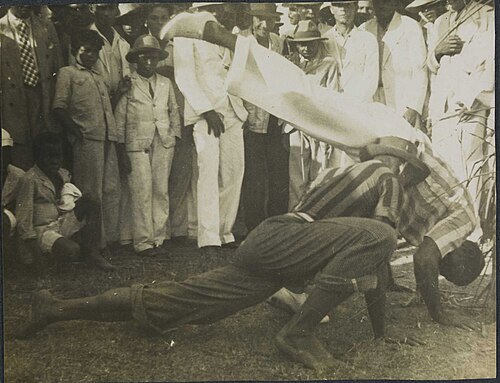Mestre Samoel Querido de Deus
- Lives in: Salvador, Bahia, Brazil
- Learned from:
- Capoeira Style: Angola
Biography:
Samuel Francisco Barreto de Souza – Mestre Querido de Deus
18?? – 194?
Samuel Francisco Barreto de Souza, widely known as Mestre Querido de Deus, stands as one of the most enigmatic and revered figures in the history of capoeira Angola in Bahia. Born in the late 19th century, Samuel carved a path of respect and admiration not only among capoeiristas but also within the intellectual and literary circles of Salvador during the 1930s and 1940s.
Unlike the well-documented Mestre Bimba or Pastinha, Samuel Querido de Deus’s legend grew mostly through his prowess in the roda, his skill with the berimbau, and his charisma among fellow practitioners. His life was closely intertwined with the people of the docks, fishermen, and local communities, reflecting a capoeira style deeply rooted in street culture rather than formal academies.
Historical records place him at key moments in capoeira history. In 1937, he led a capoeira Angola performance at the Second Afro-Brazilian Congress in Salvador, a testament to his mastery and leadership in the art. Edison Carneiro, in his seminal work Negros Bantus, recognized him as “the best capoeirista we’ve ever seen,” while Ruth Landes, observing a match in 1938, described him as a tall, muscular, middle-aged man, descalço, and a fisherman by profession—details that give life to his presence in the roda.
Samuel’s encounters with contemporaries, including the legendary Mestre Bimba, further highlight the respect and reputation he commanded. His playful yet strategic approach to the game, as recounted by Waldeloir Rêgo, showed a capoeirista who was as cunning as he was strong, turning every move into both art and a subtle challenge.
Jorge Amado immortalized him in literature, painting a vivid portrait of Samuel’s mysterious aura: a mulato with traces of indigenous and possibly Italian ancestry, seasoned by the sun and winds of the sea, yet unmatched in skill and elegance in the capoeira roda. Through Amado’s words, and the recollections of scholars and photographers of his era, Samuel Querido de Deus emerges as a figure whose legacy continues to influence capoeiristas and cultural historians alike.
Though the exact dates of his birth and death remain uncertain, Samuel’s impact is unquestionable. He is remembered not only as a master of capoeira but also as a symbol of the enduring spirit of Bahia’s streets, docks, and rodas. His name, Querido de Deus, evokes reverence and serves as a reminder of capoeira’s rich, living history—a bridge between generations, a testament to resilience, and a celebration of culture.
